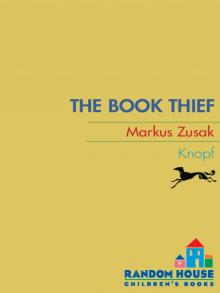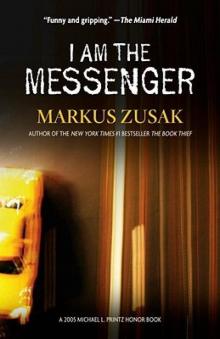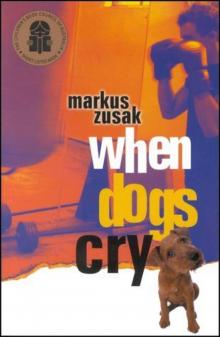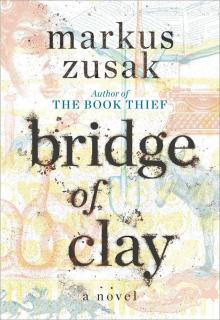- Home
- Markus Zusak
Bridge of Clay Page 4
Bridge of Clay Read online
Page 4
And the piano watched him from behind.
At Bernborough Park, when the last of them turned up, they shook hands, they laughed. They reveled. They drank in that adolescent way, all greedy-mouthed and wide open. They said “Oi!” and “Hey!” and “Where the hell have you been, you dopey deadshit?” They were virtuosos of alliteration and didn’t know it.
As soon as he’d stepped from his car, Henry’s first order of business was to make sure Clay was in the grandstand dressing sheds. Down there he’d meet today’s batch; there’d be six boys, all waiting, and what would happen was this:
They’d walk back out the tunnel.
Each of those six boys would then position himself around the 400-meter track.
Three at the 100-meter mark.
Two at the 200.
And one anywhere from the 300 to the finish.
Last, and most importantly, all six would do everything in their power to stop Clay running a single lap. Easier said than done.
As for the mob who watched, they guessed at the result. Each would call out a specific time, and that’s where Henry came in. Henry, very willingly, handled the bets. A stump of chalk in his hand, an old-school stopwatch round his neck, and he was set.
* * *
—
Today, several boys were at him immediately, down at the foot of the grandstand. To Henry, many of them weren’t even real—they were nicknames with boys attached. As for us, for all but two of them, we’ll see them here, we’ll leave them here, they’ll be fools like this forever. It’s kind of nice, when you think of it.
“Well, Henry?” asked Leper. You can only pity a guy with a nickname like that; there were scabs of various shapes, sizes, and colors all over him. Apparently he’d started doing stupid things on his bike when he turned eight, and never stopped.
Henry very nearly took pity on him, but opted instead for a smirk. “Well, what?”
“How tired is he?”
“Not very.”
“Has he run up Crapper’s stairwell yet?” This time it was Chugs. Charlie Drayton. “And up the hill to the graveyard?”
“Look, he’s good, all right, he’s in mint condition.” Henry rubbed his hands together, in warm anticipation. “We’ve got six of the best down there, too. Even Starkey.”
“Starkey! That bastard’s back, is he? That’s worth at least another thirty seconds, I reckon.”
“Oh, come on, Trout, Starkey’s all talk. Clay’ll run right past him.”
“How many floors in that apartment block again, Crapps?”
“Six,” said Henry, “and that key’s getting a bit rusty, too, old boy. Fix us up for a new one and I might even let you bet free.”
Crapper, curly-haired, curly-faced, licked his curly lips. “What? Really?”
“Okay, maybe half.”
“Hey,” said a guy named Spook, “how come Crapps gets a free bet?”
Henry interrupted before there was anything to interrupt. “Unforchantly, Spook, you pale, poor bastard, Crapps has got something we can use; he’s useful.” He walked with him, he mentored. “You, on the other hand, are useless. Get it?”
“Okay, Henry, how about this?” Crapper tried for more. “You can have my key if you give me three bets gratis.”
“Gratis? What are you, bloody French?”
“I don’t think the French say gratis, Henry. I think it might be German.”
That voice had come from out of the pack; Henry sought it out. “Was that you, Chewie, you hairy bastard? Last I heard you couldn’t speak fucking English!” To the rest of them: “Can you believe that awful prick?”
They laughed. “Good one, Henry.”
“And don’t think a ‘Good one, Henry’ll do you any extra favors.”
“Hey, Henry.” Crapper. One last try. “How about—”
“Oh, Jesus!” His voice erupted in fury, but Henry did mock-anger, not anger itself. At seventeen, he’d endured much of what life as a Dunbar could throw at him, and he always came up smiling. He also had a soft spot for Wednesdays here at Bernborough, and the boys who watched from the fence. He loved that all of this was their midweek main event, and to Clay it was one more warm-up. “All right, you bastards, who’s up first? It’s ten up front or piss off!”
He jumped to a splintery bench.
* * *
—
From there the bets went this way and that, from 2:17 to 3:46 to a resounding 2:32. With his stump of green chalk, Henry wrote the names and times on the concrete at their feet; next to bets from previous weeks.
“All right, come on, Showbag, enough’s enough.”
Showbag, also known as Vong, or Kurt Vongdara, had agonized a long time. He took few things very seriously, but this, it seemed, was one of them. “Okay,” he said. “With Starkey out there, make it, shit—5:11.”
“Jesus.” Henry smiled from his crouching stance. “And remember, boys, no mind-changing, either, or messing with the chalk—”
He saw something.
Someone.
They’d missed each other by minutes, back home in the kitchen, but now he saw him—hard and unmistakable, of dark-rust hair, and scrap-metal eyes, and chewing a piece of gum. Henry was utterly delighted.
“What’s up?” A collective question, a chorus. “What is it? What’s—” and Henry nodded upwards, to coincide with the voice, which landed amongst the chalk.
“Gentlemen—”
And for just a moment, each boy wore an oh-shit look that was utterly priceless, then all burst into action.
Everyone changed their bets.
All right, that’s it.
He’d had enough.
Grim and guilty and regretful as he was, the Murderer had come to a point; we could despise him, but we wouldn’t ignore him. Then again, his next move also felt like good manners—that since he’d entered the house without permission, he really should have warned us:
He extracted Hector from his lap.
He walked toward the piano.
Rather than open the lid to the keys (no way could he face doing that), he exposed the strings from above, and what he found was possibly worse—for lying there, inside, were two charcoal-colored books, on an old blue woolen dress. In a pocket was one of its buttons, and beneath the dress what he’d gone there for: a packet of cigarettes.
Slowly, he took it out.
His body folded up.
He fought hard to lift and straighten.
It took an effort to close the piano again, and walk back into the kitchen. He fished a lighter from out of the cutlery drawer, and stood before Achilles.
“Bugger it.”
For the first time, he dared to speak. He’d realized now that the mule wasn’t fit for attack, and so the Murderer lit up, and made his way toward the sink.
“I might as well do the dishes while I’m at it.”
Inside, the walls of the dressing room were sad with graffiti—the kind of amateur work that was nothing short of embarrassing. Clay sat barefoot, he ignored it. In front of him, Tommy was picking knots of grass from Rosy’s stomach, but the border collie soon came over. He clamped a hand down gently on her snout.
“Dunbar.”
As expected, there were six other boys, each in his own small region of the graffiti. Five of them talked and joked with each other. One paraded a girl: the animal-boy named Starkey.
“Hey, Dunbar.”
“What?”
“Not you, Tommy, y’ bloody nitwit.”
Clay looked up.
“Here.” Starkey lobbed a roll of masking tape, hitting him in the chest. When it landed on the floor, Rosy scooped it up and held it in her jaws. Clay watched her wrestle it, as Starkey ranted on.
“I just don’t want you having any excuses when I tidy you up out there, that’
s all. That, and I’ve got vivid memories of you pulling that sticky tape shit when we were younger. And there’s a lot of broken glass out there. Wouldn’t want you hurting your pretty little feet.”
“Did you say vivid?” asked Tommy.
“A thug can’t have vocab? I said nitwit, too, and that applied brilliantly to the likes of you.” Starkey and the girl enjoyed that one, and Clay couldn’t help quite liking her. He watched her lipstick and grimy grin. He also liked her bra strap, flopping over her shoulder the way it did. He didn’t mind the way they touched and sort of smudged each other, either—her crotch on his thigh, a leg each side. It was a curiosity, but nothing more. First, she was no Carey Novac. Second, this was nothing personal. To those outside, the boys in here were cogs in a beautiful machinery; a tainted entertainment. To Clay, they were colleagues of a particular design. How much could they damage him? How much could he survive?
* * *
—
He knew it was soon they’d be walking out, so now he leaned back, he closed his eyes, he imagined Carey beside him; the heat and light of her arms. In her face the freckles were pinpricks—so deep and red, but minuscule—like a diagram, or even better, a schoolkid’s connect-the-dots sheet. In her lap was the pale-covered book they shared, with its bronze and fractured lettering: THE QUARRYMAN.
Under the title it said, Everything you’ve ever wanted to know about Michelangelo Buonarroti—an infinite quarry of greatness. Inside, at the very front, was the torn-off line of a missing page; the one with the author’s biography. The bookmark was a recent betting slip:
Royal Hennessey, Race 5
#2—Matador
Win only: $1
Soon, she stood, then leaned at him.
She smiled in that interested way she had, like facing front-on at everything. She came closer and began; she put her bottom lip on his top one, and held the book between them. “He knew right then that this was the world, and all it was was a vision.”
As she quoted a favorite page, her mouth kept touching his—three times, four times, make it five—and now just slightly away:
“Saturday?”
A nod, for on Saturday night, just over three more days, they’d meet in reality, in his other favorite, forgotten field. A place called The Surrounds. There, in that place, they’d lie awake. Her hair could itch him for hours. But never would he move it, or adjust.
“Clay.” She was fading. “…It’s time.”
But he didn’t want to open his eyes.
* * *
—
In the meantime, a bucktoothed kid they called Ferret was out, and Rory, as always, was in. Whenever he showed up for old times’ sake, that was how it went.
He walked down the tunnel and entered the depressing dressing room, and even Starkey stopped showboating with the girl. Rory held a finger up, hard against his lips. He gave Tommy an almost unfriendly rummage of the hair, and stood now, over Clay. He examined him, smiling, casually, with his priceless, scrap-metal eyes.
“Oi, Clay.” He couldn’t resist. “Still mixed up in this bullshit, huh?”
And Clay smiled back, he had to.
He smiled but didn’t look up.
* * *
—
“Ready, boys?”
Henry, stopwatch in hand, let them know.
As Clay stood up, Tommy asked him; all just part of the ritual.
He pointed casually toward his pocket.
“You want me to mind it for you, Clay?”
Clay said nothing but told him.
The answer was always the same.
He didn’t even shake his head.
* * *
—
From there, they left the graffiti behind.
They walked back out the tunnel.
They shaped up to the light.
In the arena were approximately two dozen idiots, half each side, to clap them out. Idiots clapping idiots, it was tremendous. It was what this mob did best.
“Come on, boys!”
The voices were warm. Clapping hands.
“Run hard, Clay! Dig ’em in, son!”
The yellow light persisted behind the grandstand.
“Don’t kill ’im, Rory!”
“Hit him hard, Starkers, y’ ugly bastard!”
Laughter. Starkey stopped.
“Oi.” He pointed a finger and quoted the movies. “Maybe I’ll practice on you first.” Ugly bastard he didn’t mind one bit, but he couldn’t abide Starkers. He looked behind and saw his girl venture to the firewood seats in the grandstand. She had no business with the rest of this riffraff; surely one was bad enough. He shuffled his big frame to catch up.
Briefly they were all on the straight, but soon the dressing room boys drifted away. The first three would be Seldom, Maguire, and Tinker: two with agility and strength, and one brick outhouse to smother him.
The pair at the 200 would be Schwartz and Starkey, of which one was a perfect gentleman, and one a certified beast. The thing with Schwartz, though, was that while he was completely, emphatically fair, he’d be devastating in the contest. Afterwards, he’d be all white-tooth smiles and pats on the back. But at the discus net, he’d hit him like a train.
* * *
—
The gamblers were now on the move as well.
They spilled upwards, to the highest row of the grandstand, to see out past the infield.
The boys on track were prepared:
They punched the meat of their quadriceps.
They stretched and slapped their arms.
At the 100 mark, they stood a lane apart. They had great aura, their legs were alight. The falling sun behind.
At the 200, Schwartz was moving his head, side to side. Blond hair, blond eyebrows, focused eyes. Next to him, Starkey spat on the track. The whiskers on his face were dirty and alert, perpendicular to his cheeks. His hair was like a doormat. Again, he stared and spat.
“Hey,” Schwartz said, but he didn’t take his eyes from the 100. “We might land in that in a sec.”
“So?”
Then, lastly, down on the straight, maybe fifty meters from the end, Rory stood, quite easily, as if moments like these were reasonable; it was how they were meant to be.
Finally, the noise of an engine:
The car door sound like a stapler.
He tried to fend it away, but the Murderer’s pulse churned that little bit extra, most notably at the neck. He was almost desperate enough to ask Achilles to wish him luck, but at long last the mule looked a little vulnerable himself; he sniffed, and shifted a hoof.
Footsteps on the porch now.
The keyhole entered and turned.
I instantly smelt the smoke.
In the doorway, a long list of blasphemy fell silently from my mouth. A magician’s hanky of shock and horror, it was followed by miles of indecision, and a pair of bloodless hands. What do I do? What the hell do I do?
How long did I stand there?
How many times did I consider turning and walking back out?
In the kitchen (as I learned much later), the Murderer stood quietly up. He breathed the sultry air. He looked gratefully at the mule:
Don’t even think about leaving me now.
“Three…two…one…now.”
The stopwatch clicked, and Clay was on his way.
Lately they always did it like this; Henry loved how skiers were sent down the mountain on TV, and adopted the same method here.
As usual, Clay had started the countdown a distance from the line. He was impassive, blank-faced, and his barefoot feet felt great. They hit the line nicely for the now. Only when he started to run did he feel a pair of tears, bitten and burning, swell inside his eyes. Only then did his fists tighten; he was ready for it now, this idiots’ br
igade, this terrifically teenaged world. He would never see it or be it again.
The weeds at his feet swung left and right, they swayed to get out of his way. Even his breath seemed to come out of him only to escape. Still there was no feeling on his face. Just the two arching tear lines, drying as he took the first bend, toward Seldom, Maguire, and Tinker. Clay knew how to hurt them. He had one or two of most things, but also a thousand elbows.
“Here.”
Business-like, they converged.
They met him in Lane Four with noxious sweat and forearms, and his legs continued to run, diagonally in the air. Momentum, somehow, was his. His right hand dug into the rubber, then a knee, and he threw Maguire behind him; he fended Seldom’s face. In an instant he could see the poor guy fog up, and he brought him down next, and hard.
By then, the rotund Brian “Tinker” Bell—with the secondary nickname of Mr. Plump—came in with a gluttonous thump. It was a fist across the throat, an ample chest against his back. He whispered, hot and hoarsely, “I gotcha now.” Clay didn’t like being whispered to like that. He also didn’t care much for gotcha, and very soon there was a very sad sack lying amongst the weeds. A sack with a bleeding ear. “Fark!” The boy was gone.
Yes, Tinker was forgotten, but the other two came back, one hurt, one strong; it wasn’t enough. Clay pushed away. He strode out. He took hold of the worn back straight.
* * *
—
Now he eyed the next two, and they hadn’t expected him so soon.
Schwartz steadied himself.
Starkey spat again. The guy was a Goddamn fountain. A gargoyle!
“Come on!”
That was the creature in Starkey’s voice box now, crying a call to arms. He should have known better, that Clay wouldn’t be threatened, or inflamed. In the background, the first three boys were hunched, all just blurry shapes, as he swung out wide, then changed. He aimed more for Starkey, who by now wasn’t spitting, but veering. He reacted barely in time to get a finger onto the very top thread of Clay’s shorts, and then, of course, came Schwartz.

 The Book Thief
The Book Thief I Am the Messenger
I Am the Messenger When Dogs Cry
When Dogs Cry Underdogs
Underdogs Underdogs: Three Novels
Underdogs: Three Novels Bridge of Clay
Bridge of Clay